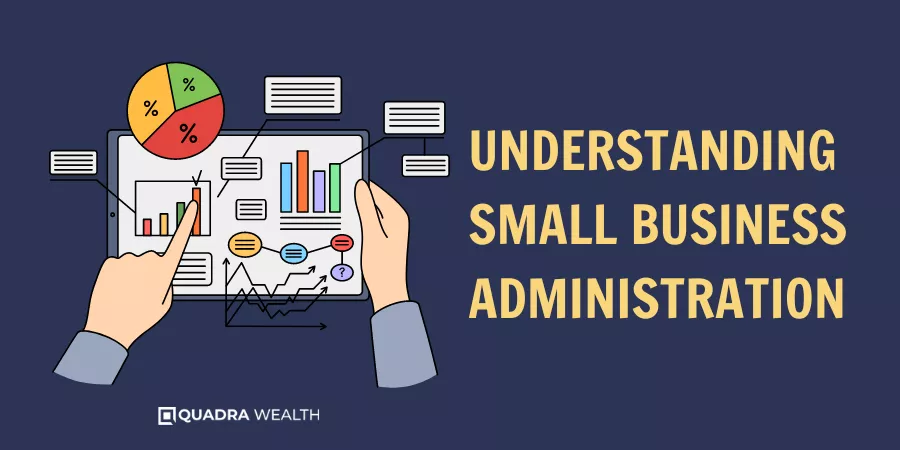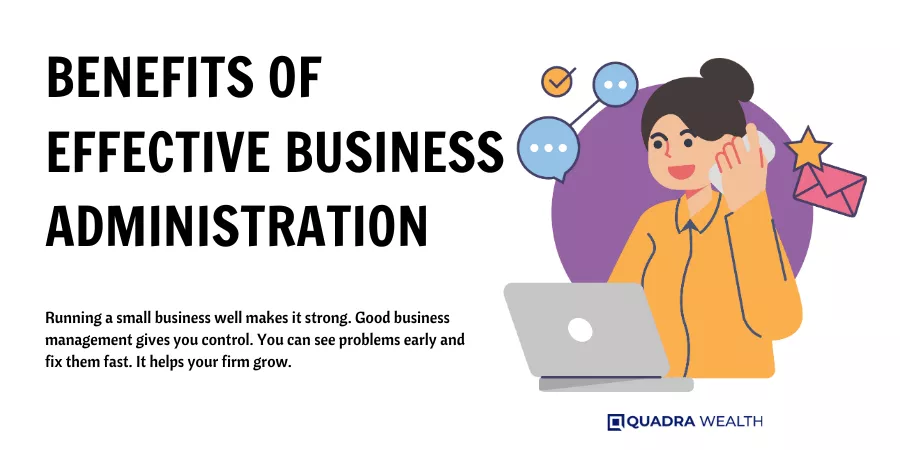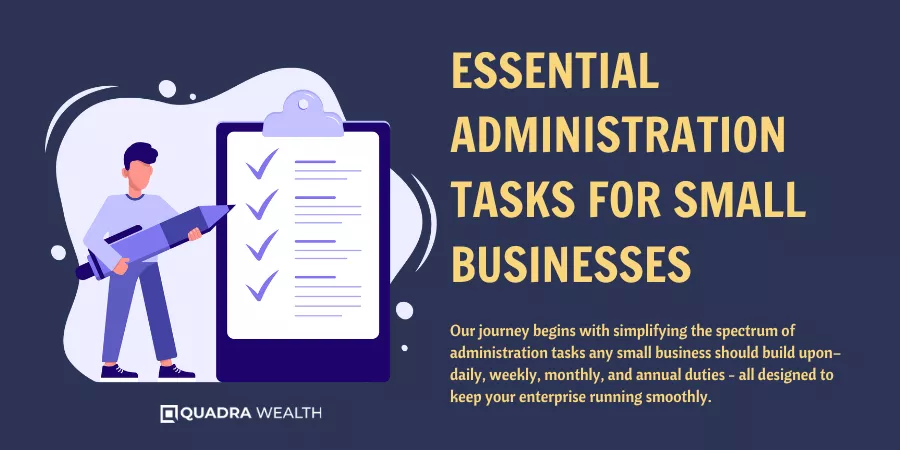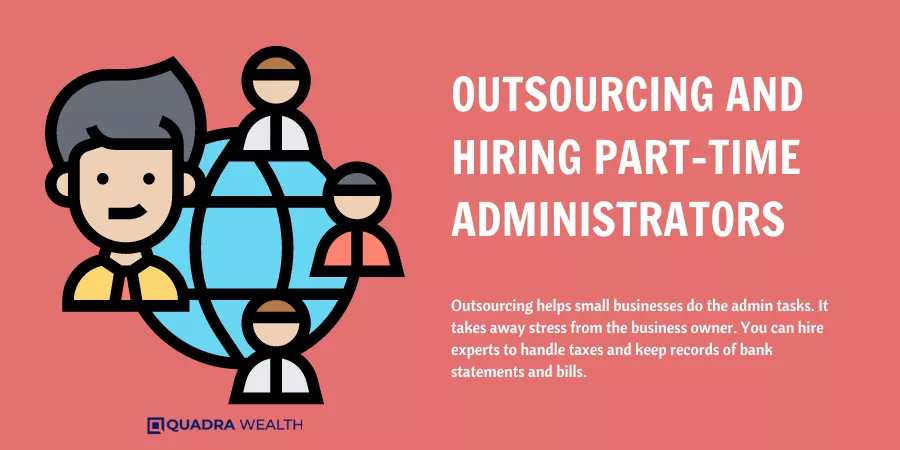In This Article
Administration for small business

Are you overwhelmed by the administrative tasks that come with running your small business? Did you know, that effective business administration can greatly improve your operational efficiency and profitability?
This blog will guide you through the key aspects of small business administration, including essential tasks, organizational tips, resources available, and more. Get ready to simplify your administrative duties while boosting profits!
Key takeaways
● Small Business Administration (SBA) is a U.S. agency. It helps people start and run small businesses
● Good business management makes a firm strong. The SBA offers loans, and help with goals and contracts.
● Each day, weekly, monthly, and yearly tasks need to be finished for money control.
● To keep all important work safe, one must choose the best storage method like cloud or local options.
● Tools like accounting software can make managing money easy and fast.
● Stores that offer resources to help manage small businesses include Small Business Development Centers and SCORE.
● The agency offers various resources to small businesses, including access to capital, entrepreneurial development, government contracting, and advocacy services.
Understanding Small Business Administration
The Small Business Administration (SBA) is an agency of the United States government. It helps people start and grow small businesses. The SBA works with banks, credit unions, and other lenders to make loans happen.
These are called SBA loans.
The work of the SBA is guided by three C’s: capital, contracts, and counseling. Capital comes from their help in getting loans for small businesses. Contracts mean they aid in getting deals between firms and the government.
Counseling includes helping business owners learn new things to run their companies better.
Lastly, when a disaster hits like a big storm or earthquake; the SBA also steps in to help the affected businesses get back on their feet quickly through financial aid.

Benefits of Effective Business Administration
Running a small business well makes it strong. Good business management gives you control. You can see problems early and fix them fast. It helps your firm grow.
A clear plan guides your work each day. The Small Business Administration offers help to set goals and meet them. They give out loans too, like the 7(a) Loan Guarantee Program.
Managing money in the right way gets rid of waste. Suppliers will value you more if bills get paid on time and in full every month. Securing contracts becomes easier as federal ones are often given to well-run firms by the SBA—about 23 percent of those offered.

Essential Administration Tasks for Small Businesses
Our journey begins with simplifying the spectrum of administration tasks any small business should build upon– daily, weekly, monthly, and annual duties – all designed to keep your enterprise running smoothly.
There’s a lot more insight just around the corner– continue reading to unlock it.

Daily Tasks
Running a small business involves doing some tasks every day. Checking the business bank account is one of them. Small businesses must do this to stay on top of their money management. This helps to know the cash in and outflows. Recording all expenses is another daily task. Keep track of where your funds are going. Small businesses need to pay suppliers for items bought. This task has a big part in administration work.
Weekly Tasks
Weekly tasks keep a small business running smoothly. Here are some key jobs you must do every week:
- Check your bank account for payments in and out.
- Send invoices to customers for the goods or services you provide.
- Pay your suppliers for the products they gave you or any service they did. Paying them on time is good for your business.
- Look through all invoices that have not been paid yet by customers, and follow up with them about it.
- Keep an eye on how much stock you have left of your products.
- Update any changes in employee work hours into the payroll system for correct pay.
- Prepare a quick report of total sales, costs, and profit for the week to understand how your business is doing.
Monthly Tasks
Small business owners need to take care of certain tasks every month. These help keep the business afloat and on track.
- Send out invoices: This is how businesses ask for payment. If done soon, it can speed up cash flow.
- Run payroll: This makes sure that all workers get their money on time.
- Manage inventory: Keep an eye on what is in stock so you don’t run out of key items.
- Review your business: Spend some time looking at how things are going, using data to spot trends and make changes as needed.
Annual Tasks
Good business owners keep track of tasks they need to do once a year. These tasks steer the business in the right way. Here are important tasks that small businesses must do each year:
- Filing Self-Assessment Tax Returns: This is a must for all sole traders.
- Completing Accounts and Company Tax Returns: If you own a limited company, you have to do this each year.
- Annual Insurance Review: Check your business insurance yearly. It is good to find better deals.
- Checking on Business Performance: Each year, get a close look at how well your business does.
- Planning For The Future: Once every 12 months, set new goals and plans for your business.
Organizing Small Business Paperwork
Effective paperwork organization is crucial in running a small business. An ideal method of storage for all important documents must be utilized, whether that’s local or cloud-based.
Good accounting software can streamline this task and help keep your finances organized efficiently. Regular maintenance of the cash book helps monitor the inflow and outflow of money from businesses accurately.
Lost receipts could mean lost proof of expenses so it’s vital to have a reliable receipt storage system in place. Lastly, spreadsheets provide visual data representation for easier financial analysis, therefore learning how to use them could prove beneficial.

Accounting Software
Accounting software can help small businesses a lot. You can use it to keep track of sales and expenses each day. It also does other tasks that save time for you. With this tool, you understand your business’s money matters better and make wise choices.
Plus, if you pick cloud-based accounting software, all your data is safe in the cloud! This means no worries about losing vital records or paperwork ever again.
Cash Book Maintenance
Keeping a cash book helps you track money that comes in and out of your small business. Every sale or expense goes on the list. This way, you see just how much your company makes and spends each day.
Doing this can show where to make changes should problems arise. Also, it keeps things straight for tax time, as per the Small Business Administration (SBA). So take care to work on your cash book often.
Make sure it matches with bank statements too! This is one step towards good business performance managements.
Receipt Storage
Storing receipts in a good way is key to running a business. Digital storage lets you hold your receipts safely and is easy to find. It is better than storing paper copies that can be lost or damaged over time.
You use tools like accounting software for this task.
Cloud stores are also great places to keep your digital receipt records. They are safe from problems like computer crashes, theft, or other losses. With cloud storage, your receipt data stays protected and always there when needed.
Cloud vs Local Storage
When managing administration for a small business, it’s crucial to choose the right storage solution. The main considerations are between cloud and local storage. Each has its own advantages and challenges.
| Cloud Storage | Local Storage |
Definition | Cloud storage allows for the storage and access of documents and files on remote servers through the Internet. | Local storage refers to storing documents and files on physical devices such as computers, external hard drives, or servers located on-premises. |
Accessibility | With cloud storage, files can be accessed from anywhere with an internet connection. | Local storage requires physical access to the place where the files are stored for retrieval. |
Cost | Cloud storage can be more cost-effective for small businesses as it eliminates the need for physical hardware and maintenance. | Local storage may require more upfront investment in hardware and infrastructure. |
Security | Cloud storage offers encryption and backup options, providing a layer of security. | Local storage gives more direct control over data security but lacks automatic encryption or backup services. |
Deciding between cloud and local storage will depend on the specific needs and resources of your small business.
Use of Spreadsheets
Spreadsheets help small businesses a lot. Tools like Microsoft Excel and Google Sheets serve this purpose well. They hold data on the money coming in and going out of the business.
Small business owners use them to track costs, sales, and overall cash flow. With spreadsheets, it gets easy to see how the business is doing financially. As a result, making plans becomes more clear-cut.
The use of these tools also makes organizing paperwork easier than before.
- Capital Access
- Financial Aid
- Counseling & Education
- Govt. Contracts
- Local Resources
- Disaster Assistance
- Minority/Women Support
- Complex Applications
- Strict Eligibility
- Limited Loans
- High Rates/Fees
- Govt. Bureaucracy
- Resource Competition
- Default Risk
- No Guaranteed Success
Resources for Small Business Administration
Whether you’re a seasoned entrepreneur or just starting out, various resources are available to assist in small business administration. Small Business Development Centers provide invaluable services such as business plan providing assistance and market research.
The Office of Women’s Business Ownership aids women entrepreneurs by offering training and counseling services. SCORE is another resource filled with retired executives who willingly give their insights on running businesses successfully.
For veterans transitioning into entrepreneurship, the Veteran Business Outreach Centers (VBOC) offer numerous training interventions. These resources offer diverse support aimed at bolstering small business success nationwide.

Small Business Development Centers
Small Business Development Center (SBDC) can help your business grow. They offer training and help to people who own businesses or want to start one. These centers are partners with the Small Business Administration (SBA).
The goal is simple: make small businesses strong so they can help our overall economy.
Every year, SBDCs and other SBA groups work with more than 1 million small business owners. To do this, SBDCs get grants from the SBA. This money helps them give support and advice to both new and old businesses.
The Office of Women's Business Ownership
The Office of Women’s Business Ownership helps women who want to start a business. It is tied with the Small Business Administration (SBA). They have Women’s Business Centers all over the country.
These centers give tools and help to women who are starting their own businesses. The business development program for new businesses includes these Women’s Business Centers too. So, this office plays a big part in giving small business owners what they need.
SCORE (Service Corps of Retired Executives)
SCORE stands for Service Corps of Retired Executives. It’s a group that helps small business owners. Many retired business professionals work for SCORE. These old pros offer free advice and lessons to people running small businesses.
The Small Business Administration (SBA) gives money to support this good work by SCORE. You can learn a lot from the wisdom of these senior pros when you own your own company.
Veteran Business Outreach Centers (VBOC)
Veteran Business Outreach Centers help vets who own businesses. They give these owners help and advice. They teach them skills to make their business better. These centers are run by the Small Business Administration’s Office of Veteran Business Development.
This office helps veterans’ businesses grow. The service is not just for vets but also for their families. A vet can get help from a center no matter where they live in the U.S.
Outsourcing and Hiring Part-Time Administrators
Outsourcing helps small businesses do the admin tasks. It takes away stress from the business owner. You can hire experts to handle taxes and keep records of bank statements and bills.
This allows more time for you to deal with important parts of your firm.
You may also choose a part-time administrator instead of outsourcing. Like an outsourced person, this worker will help manage money factors and track income or output actions. They do not require full pay, yet they offer much-needed support on vital duties in your outfit.
Hence, part-time workers are both useful and cost-effective options for firms with tight budgets.

Entrepreneurial Development Programs
Explore your funding options through programs such as the Loan Guarantee Program, Disaster Loan Program, and Microloan Program. Learn how these initiatives can provide ways to secure financial backing for your small business operations.
These resources are designed to help entrepreneurs thrive in the challenging world of small business with expanded opportunities ensuring success and growth. Make use of Entrepreneurial Development Programs to turn obstacles into stepping stones on your path toward sustaining a successful enterprise.
Loan Guarantee Program
The Loan Guarantee Program helps small businesses get money. Banks, credit unions, and other lenders work to partner with the SBA for this program. The role of the SBA is to assure a part of the loan.
That way, a lender feels safe giving money to the business. In some cases, up to 90 percent guarantee is provided by the SBA under this program! This special rule was made under two U.S. laws known as Recovery Act and the Small Business Act.
Out of all, the SBA loan program they offer, its 7(a) Loan Guarantee Program is quite well-known and widely used.
Disaster Loan Program
The Disaster Loan Program is a help for small businesses and homeowners. This program comes from the Small Business Administration (SBA). It gives long-term, low-interest loans to those hit by declared disasters.
The SBA backs part of these loans with government guarantees. The aim is to make our nation’s economy strong again after a disaster. With this program, small businesses can get the money they need to rebuild and recover.
Microloan Program
The Microloan Program is a great help for small businesses and nonprofits. It gives loans to special agencies known as intermediaries. These loans reach up to $50,000. Money from these loans often goes to small companies or child-care centers that are nonprofit.
The U.S. federal government Small Business Administration (SBA) backs part of the loan amount in this program. This makes lenders feel more safe to give out money. Some other places like the Women’s Business Centers and Small Business Development Centers also support this push by offering advice and teaching skills needed in running businesses successfully.
Conclusion
Running a small business is an exciting challenge. Good admin plays a key role in this. It keeps money flowing, works organized, and helps to build success. So embrace the admin tasks as part of your business growth journey!
FAQs
Business administration helps with important tasks like record-keeping, filing taxes, payroll runs, and inventory management.
Programs like the HUBZone Program offer business training services and capital access for socially and economically disadvantaged individuals to boost your company’s growth.
Small businesses can get Disaster Assistance through different loans such as Business Physical Disaster Loans or Home and Personal Property Loans after a tough event.
The Paycheck Protection Program supports your case when you face loan default by providing funds to pay staff during hard times.
Yes! The SBA’s Office of Veteran Business Development abounds with plans that cater directly to women-owned businesses or minority groups’ firms.
There may be legal obligations related to HMRC regarding taxes & you must also take extra steps if fraudulent bills appear in your name.

Why You Need a Personal Financial Manager?
Personal finance management (PFM) is not confined to budgeting and investment any longer. There are

Nearing Retirement Advice for a Secure Future
Nearing retirement advice? A plan for retirement is essential to enjoy a happy healthy life

What is Debt Ceiling? A Complete Guide for Beginners
What is Debt Ceiling? Debt Ceiling, also known as the debt limit, is the highest

Is It Possible to Have No Debt?
Debt is often considered the norm in the corporate world, but the debt free companies




